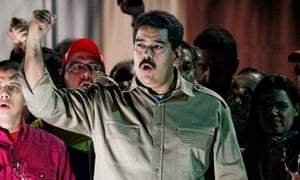Critics express outrage over president's new right to rule by decree as he blames crisis on 'economic warfare'
"What you have seen is little compared to what we will do to defend the people and their rights," Maduro said on Tuesday night shortly after being granted the power to rule by decree, allowing him to create laws on his own, without consulting congress.
Maduro says the special powers will enable him to regain control of the country's collapsing economy – which the president blames on "economic warfare" being waged by his opponents to destabilise his rule before December's municipal elections.
Last week, Maduro ordered shops around the country to slash their prices by more than half and announced that as many as "100 parasitic bourgeois managers" would be imprisoned for usury.
Critics of the government say ruling by decree will do little to fight corruption or solve the root problems behind the oil-rich nation's mounting inflation, but will underline Maduro's message that he will remain true to the political line of his mentor Hugo Chávez.
"Maduro is continuing with the plan to instate a Cuban-style socialism that Chávez left incomplete. This advance implies a statist model economy, with more interventions and the creation of new institutions. The Venezuelan economy as we knew it is being destroyed," said Prof Margarita López-Maya, a sociologist at Venezuela's Central University.
In his address from the presidential palace, Maduro said the measures would allow him to restrict retail profits, fix prices, and control imports as well as other unspecified changes to the economy.
Many fear, however, that Maduro's move will deter investors and fail to preventanother wave of shortages in 2014.
Maduro has assured voters that the companies seized by the National Guard after last week's announcement have enough stock for the next year. "It is untrue that there will be shortages, false. We have controlled the storage systems of all these companies and they are full. We have reserves for more than a year," he said.
Nicmer Evans, a political analyst, said the emergency powers were essential for the government to prevent the economy spiralling out of control.
Nicmer Evans, a political analyst, said the emergency powers were essential for the government to prevent the economy spiralling out of control.
"We are facing a real and deep economic crisis. Ruling by decree allows the president to do in months what it would take the assembly years," said Evans. "It has none of the parameters of socialism. It is [a return] to normal capitalism because it is not normal that Venezuelans pay 1,000% over price."
The emergency measure – known in Spanish as an enabling law – was approved after an opposition lawmaker was stripped of her parliamentary rights and replaced with her substitute – a Maduro loyalist – giving the president the 99 votes needed to secure the two-thirds majority.
The move has outraged many in the fractured opposition who are calling supporters to close ranks in the upcoming elections. "This enabling law is corrupt in its origin and it will be corrupt in its execution. Venezuelans must defeat corruption in December's [municipal] elections", said the opposition leader Henrique Capriles.
Maduro's economic populism has succeeded in rallying his political base, said Evans; the challenge now will be for the president to maintain that support. "If he fails at that – and fails to engage with business and industry – we'll surely face a decrease in imports, more shortages and the collapse of the whole house of cards."

No comments:
Post a Comment